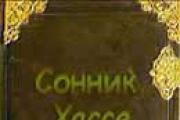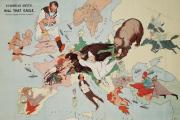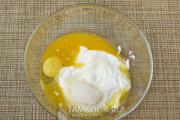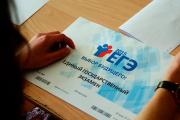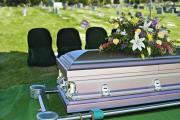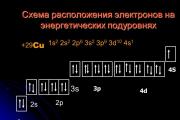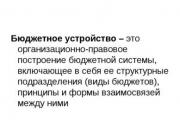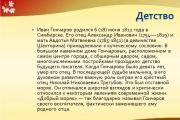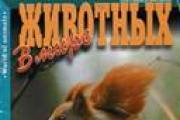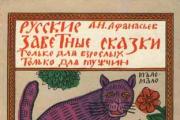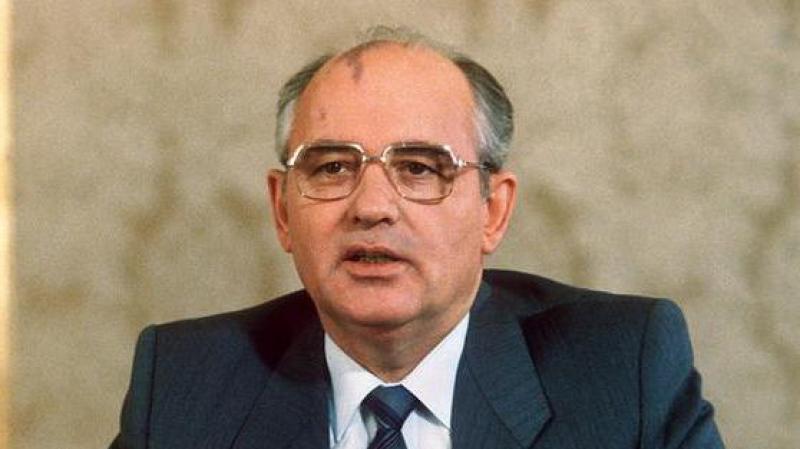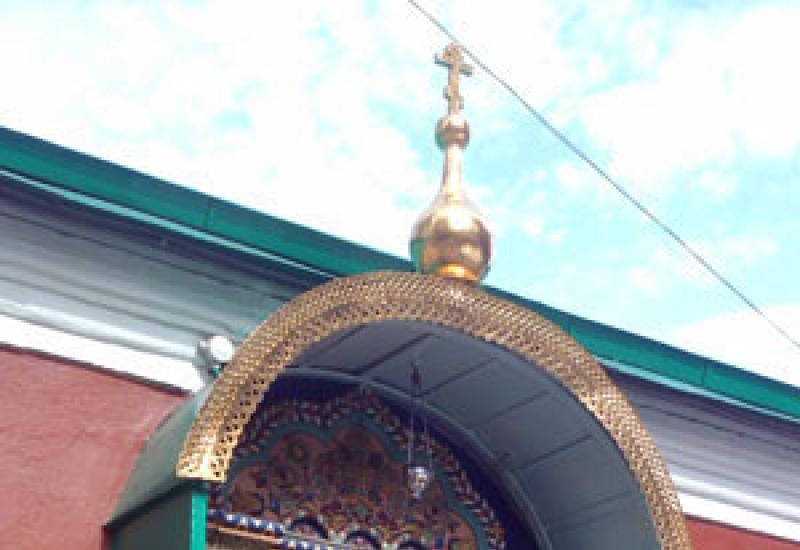Marfa of Novgorod. Boretskaya marfa. What do we know about Marfa Boretskaya
Nizhny Novgorod
Marfa Boretskaya(known as Martha the Posadnitsa, various sources indicate patronymic Semyonovna or Ivanovna) - wife of the Novgorod mayor Isaac Boretsky.
Biography
Very little is known about the initial period of Martha's life. It is known that she came from the boyar family of Loshinsky and that she married twice. The first husband was the boyar Philip; the marriage produced two sons, Anton and Felix, who drowned on the Karelian coast of the White Sea. Her second husband was the Novgorod mayor Isaac Boretsky. Marfa Boretskaya never was and could not be formally a “posadnik”. This nickname was simply an evil mockery of Muscovites at the state system of the original republic - Veliky Novgorod. Being the widow of a wealthy landowner and herself owning vast lands along the banks of the Dvina and the Icy Sea, she first appears on the political scene of Novgorod in 1470 during the election of the new Archbishop of Novgorod. Pimen, supported by her, does not receive rank, and the chosen Theophilus is ordained in Moscow, and not in Kyiv, as the Lithuanian party wanted.
Martha and her son, Novgorod sedate posadnik Dmitry, in 1471 they advocated the withdrawal of Novgorod from dependence on Moscow, established by the Yazhelbitsky Peace (1456). Martha was the informal leader of the boyar opposition to Moscow, she was supported by two more noble Novgorod widows: Anastasia (the wife of the boyar Ivan Grigorievich) and Euphemia (the wife of the mayor Andrei Gorshkov). Martha, who had significant funds, negotiated with the Grand Duke of Lithuania and King of Poland Casimir IV about the entry of Novgorod into the Grand Duchy of Lithuania on the basis of autonomy while preserving the political rights of Novgorod.
Having learned about the negotiations on the annexation of Novgorod to the Grand Duchy of Lithuania, Grand Duke Ivan III declared war on the Novgorod Republic and defeated the army of Novgorod in the Battle of Shelon (1471). Dmitry Boretsky was executed as a political criminal. However, Novgorod's right to self-government in its internal affairs was preserved. Martha, despite the death of her son and the actions of Ivan III, continued negotiations with Casimir, who promised her support. A conflict arose between the Lithuanian and Moscow parties, which became known to Ivan III. In 1478, during a new military campaign, Ivan III finally deprived the Novgorod lands of the privileges of self-government, extending the power of autocracy to them. As a sign of the abolition of the Novgorod veche, the veche bell was taken to Moscow, and sentences were passed on influential citizens. Martha's lands were confiscated, she and her grandson Vasily Fedorovich Isakov were first brought to Moscow and then deported to Nizhny Novgorod, where they were tonsured into monasticism under the name of Mary in the Conception (from 1814 - Holy Cross) Monastery, in which she died in 1503. According to another version, Martha died or was executed on the way to Moscow in the village of Mleve, Bezhetsk Pyatina, Novgorod Land.
In Russian chronicles, Martha Boretskaya is compared to Jezebel, Delilah, Herodias and Empress Eudoxia. The accusations against her include a desire to marry a “Lithuanian lord” in order to own Novgorod after its annexation to the Principality of Lithuania.
Marfa Boretskaya and Zosima Solovetsky
The Life of Zosima Solovetsky tells that Zosima Solovetsky, the founder of the Solovetsky Monastery, predicted the fall of Martha Boretskaya. This prophecy is associated with Zosima's visit to Novgorod during the conflict between the monastery and the Novgorod Republic regarding the monastery's fishing rights. Martha once drove the monk out of Novgorod and he predicted: “ The time will come when the residents of this house will not walk in their yard; the doors of the house will be shut and will not open again; this yard will be empty" After some time, at the invitation of Archbishop Theophilus, Zosima again visited Novgorod and Martha, repentant, received him in her home. She gave the Solovetsky Monastery a charter regarding the rights to toni (fishing places). Subsequently, an opinion arose that this document could not have been issued by Martha, but was a late forgery of the Solovetsky monks.
In art
- Martha the Posadnitsa, or the conquest of Novgorod - a historical story by Nikolai Karamzin
- Marfa the Posadnitsa - 1910 film.
- Marfa Posadnitsa - poem by Sergei Yesenin.
- Marfa-Posadnitsa - novel by Dmitry Balashov ()
- The Lament of Martha the Posadnitsa - song by Alexander Gorodnitsky ()
- The Widow's Platter - a story by Boris Akunin ()
- Marfa, Posadnitsa Novgorod - a historical tragedy in the verses of Mikhail Pogodin ()
Write a review of the article "Boretskaya, Marfa"
Notes
Literature
- Rudakov V. E.// Encyclopedic Dictionary of Brockhaus and Efron: in 86 volumes (82 volumes and 4 additional). - St. Petersburg. , 1890-1907.
- Ikonnikov V.// Russian biographical dictionary: in 25 volumes. - St. Petersburg. -M., 1896-1918.
| Predecessor: Isaac Boretsky |
Novgorod Posadnitsa (de facto) - |
Successor: abolition of the republic and its capture by Ivan III |
Excerpt characterizing Boretskaya, Marfa
These first days, until September 8th, the day on which the prisoners were taken for secondary interrogation, were the most difficult for Pierre.X
On September 8, a very important officer entered the barn to see the prisoners, judging by the respect with which the guards treated him. This officer, probably a staff officer, with a list in his hands, made a roll call of all the Russians, calling Pierre: celui qui n "avoue pas son nom [the one who does not say his name]. And, indifferently and lazily looking at all the prisoners, he ordered the guard the officer should properly dress and clean them up before leading them to the marshal. An hour later, a company of soldiers arrived, and Pierre and the other thirteen were taken to the Maiden's Field. The day was clear, sunny after the rain, and the air was unusually clear, as in the evening. that day when Pierre was taken out of the guardhouse at Zubovsky Val; smoke rose in columns in the clear air. The fires were nowhere to be seen, but columns of smoke rose from all sides, and all of Moscow, everything that Pierre could see, was one conflagration. On all sides one could see vacant lots with stoves and chimneys and occasionally the burnt walls of stone houses. Pierre looked closely at the fires and did not recognize the familiar quarters of the city. In some places the Kremlin could be seen, undestroyed, white from afar with its towers and Ivan the Great. Nearby, the dome of the Novodevichy Convent glittered merrily, and the bell of the Gospel was especially loudly heard from there. This announcement reminded Pierre that it was Sunday and the feast of the Nativity of the Virgin Mary. But it seemed that there was no one to celebrate this holiday: everywhere there was devastation from the fire, and among the Russian people there were only occasionally ragged, frightened people who hid at the sight of the French.
Obviously, the Russian nest was ravaged and destroyed; but behind the destruction of this Russian order of life, Pierre unconsciously felt that over this ruined nest his own, completely different, but firm French order had been established. He felt this from the sight of those soldiers walking cheerfully and cheerfully, in regular rows, who escorted him with other criminals; he felt this from the sight of some important French official in a double carriage, driven by a soldier, driving towards him. He felt this from the cheerful sounds of regimental music coming from the left side of the field, and especially he felt and understood it from the list that the visiting French officer read this morning, calling out the prisoners. Pierre was taken by some soldiers, taken to one place or another with dozens of other people; it seemed that they could forget about him, mix him up with others. But no: his answers given during the interrogation came back to him in the form of his name: celui qui n "avoue pas son nom. And under this name, which Pierre was afraid of, he was now being led somewhere, with undoubted confidence written on them faces that all the other prisoners and he were the ones who were needed, and that they were being led where they needed to be. Pierre felt like an insignificant sliver caught in the wheels of a machine unknown to him, but functioning correctly.
Pierre and other criminals were led to the right side of the Maiden's Field, not far from the monastery, to a large white house with a huge garden. This was the house of Prince Shcherbatov, in which Pierre had often visited the owner before and in which now, as he learned from the conversation of the soldiers, the marshal, the Duke of Eckmuhl, was stationed.
They were led to the porch and one by one they were led into the house. Pierre was brought in sixth. Through a glass gallery, a vestibule, and an antechamber, familiar to Pierre, he was led into a long, low office, at the door of which stood an adjutant.
Davout sat at the end of the room above the table, glasses on his nose. Pierre came close to him. Davout, without raising his eyes, was apparently coping with some paper lying in front of him. Without raising his eyes, he quietly asked:
– Qui etes vous? [Who are you?]
Pierre was silent because he was unable to utter words. For Pierre, Davout was not just a French general; for Pierre Davout, he was a man known for his cruelty. Looking at the cold face of Davout, who, like a strict teacher, agreed to have patience for the time being and wait for an answer, Pierre felt that every second of delay could cost him his life; but he didn't know what to say. He did not dare say what he said during the first interrogation; revealing one's rank and position was both dangerous and shameful. Pierre was silent. But before Pierre could decide on anything, Davout raised his head, raised his glasses to his forehead, narrowed his eyes and looked intently at Pierre.
“I know this man,” he said in a measured, cold voice, obviously calculated to frighten Pierre. The cold that had previously run down Pierre's back gripped his head like a vice.
– Mon general, vous ne pouvez pas me connaitre, je ne vous ai jamais vu... [You couldn’t know me, general, I’ve never seen you.]
“C"est un espion russe, [This is a Russian spy,"] Davout interrupted him, addressing another general who was in the room and whom Pierre had not noticed. And Davout turned away. With an unexpected boom in his voice, Pierre suddenly spoke quickly.
“Non, Monseigneur,” he said, suddenly remembering that Davout was a Duke. - Non, Monseigneur, vous n"avez pas pu me connaitre. Je suis un officier militianaire et je n"ai pas quitte Moscow. [No, Your Highness... No, Your Highness, you could not know me. I am a police officer and I have not left Moscow.]
- Votre nom? [Your name?] - repeated Davout.
- Besouhof. [Bezukhov.]
– Qu"est ce qui me prouvera que vous ne mentez pas? [Who will prove to me that you are not lying?]
- Monseigneur! [Your Highness!] - Pierre cried out in a not offended, but pleading voice.
Davout raised his eyes and looked intently at Pierre. They looked at each other for several seconds, and this glance saved Pierre. In this view, apart from all the conditions of war and trial, a human relationship was established between these two people. Both of them in that one minute vaguely experienced countless things and realized that they were both children of humanity, that they were brothers.
At first glance for Davout, who only raised his head from his list, where human affairs and life were called numbers, Pierre was only a circumstance; and, not taking the bad deed into account on his conscience, Davout would have shot him; but now he already saw a person in him. He thought for a moment.
– Comment me prouverez vous la verite de ce que vous me dites? [How will you prove to me the truth of your words?] - Davout said coldly.
Pierre remembered Rambal and named his regiment, his last name, and the street on which the house was located.
“Vous n"etes pas ce que vous dites, [You are not what you say.],” Davout said again.
Pierre, in a trembling, intermittent voice, began to provide evidence of the truth of his testimony.
But at this time the adjutant entered and reported something to Davout.
Davout suddenly beamed at the news conveyed by the adjutant and began to button up. He apparently completely forgot about Pierre.
When the adjutant reminded him of the prisoner, he frowned, nodded towards Pierre and said to be led away. But Pierre didn’t know where they were supposed to take him: back to the booth or to the prepared place of execution, which his comrades showed him while walking along the Maiden’s Field.
He turned his head and saw that the adjutant was asking something again.
- Oui, sans doute! [Yes, of course!] - said Davout, but Pierre didn’t know what “yes” was.
Pierre did not remember how, how long he walked and where. He, in a state of complete senselessness and dullness, not seeing anything around him, moved his legs along with the others until everyone stopped, and he stopped. During all this time, one thought was in Pierre’s head. It was the thought of who, who, finally sentenced him to death. These were not the same people who interrogated him in the commission: not one of them wanted and, obviously, could not do this. It was not Davout who looked at him so humanly. Another minute and Davout would have realized that they were doing something wrong, but this moment was interrupted by the adjutant who entered. And this adjutant, obviously, did not want anything bad, but he might not have entered. Who was it that finally executed, killed, took his life - Pierre with all his memories, aspirations, hopes, thoughts? Who did this? And Pierre felt that it was no one.
Aristocrat Marfa Boretskaya became the last mayor of Novgorod. She led the struggle of the townspeople against the Moscow prince Ivan III, who nevertheless subjugated the ancient republic and made it part of the unified Russian state.
Martha's personality
Posadnitsa Marfa Boretskaya came from a boyar family. Her date of birth is not known exactly; information about her childhood and teenage years has also not been preserved. She appeared in the chronicles as the wife of the Novgorod mayor Isaac Boretsky, from whom she received her surname. The husband died in the second half of the 50s of the 15th century (the latest information about him dates back to 1456). He left his wife a lot of money and land. All these resources allowed Marfa to become one of the most influential figures in the public life of Novgorod.
In history, this woman is known as the “posadnitsa”, but Boretskaya never formally had such a title. It was just a mocking nickname given to her by Muscovites, who hated her as a principled enemy. Nevertheless, we can say for sure that Martha was the de facto ruler of Veliky Novgorod from 1471 to 1478. These were the last days of the republic's independence, when it fought with Moscow for sovereignty.
Fame in Novgorod
For the first time, Martha Boretskaya declared herself as an important political figure when elections for a local archbishop were held in 1470. She supported Pimen (and tried to defend his candidacy with the help of gold), but in the end, Moscow’s protege, Theophilus, was chosen. In addition, the new archbishop was to be consecrated in the capital of Ivan III, and not in Kyiv, as had always happened before.
Martha could not forgive such an insult, and from that moment she began to establish contacts with the Lithuanian party in Novgorod. This political movement advocated the rapprochement of the city with the Grand Duke of Vilnius, and not with the Moscow ruler. This position was contrary to the conditions that were agreed upon during the signing of the Yazhelbitsky Peace Treaty.
This paper was signed in 1456 (still under the father of Ivan III - Vasily the Dark). The agreement established the dependence of Novgorod on Moscow with the formal preservation of old institutions and orders (veche, title of mayor, etc.). The conditions have been met, at the very least, for many years. This was a compromise between the powerful influence of Moscow on all Russian lands and the old republican system of Novgorod.

Supporter of Poland
Marfa Boretskaya decided to go against the established order. It was she who led the boyar opposition against Ivan III and sought support from Casimir IV (Poland and Lithuania existed within the framework of a union concluded between themselves). Martha, using her own money, sent an embassy to a foreign monarch, asking him to accept Novgorod as an autonomy into her possessions. The conditions were agreed upon, and the governor, Mikhail Olelkovich, arrived in the city. These events infuriated Ivan III. In 1471 he declared war on Novgorod.

Preparing for war
Before sending his army north, Ivan tried to resolve the conflict through diplomacy. He turned to the help of an authoritative intermediary in the person of the Church. The Moscow Metropolitan went to Novgorod, where he reproached its inhabitants and Martha for betraying Moscow. He also urged to abandon the union with the Catholic state. Such an act could be regarded as a departure from Orthodoxy.
What is Marfa Boretskaya famous for? With your intransigence. She refused to make concessions to the enemy. Having learned about this, Ivan III declared a crusade against Catholic dominance in Orthodox Novgorod. Such a slogan allowed him to gather many supporters, including residents of Pskov, Ustyug and Vyatichi, who in another situation might have refused to help Moscow. The army went on a campaign even despite the fact that the Polish governor Mikhail Olelkovich left the banks of the Volkhov and went to Kyiv.
The characteristic of Marfa Boretskaya was also that she did not give up in moments of terrible danger. An army was also gathered in Novgorod. Its organization did not take place without the participation of Martha. In addition, her son Dmitry, who was then a formal mayor, himself ended up in the army.

Battle of Shelon
The Moscow army, under the leadership of the famous governors Daniil Kholmsky and Fyodor Motley, captured and burned the important fortress of Rusa. After this success, the squad stopped to wait for reinforcements from Pskov. At the same time, additional Moscow regiments linked up with the Tver detachment and also headed north.
The Novgorod army included 40 thousand people. It headed towards Pskov to prevent his army from uniting with Kholmsky. The Moscow governor guessed about the enemy’s plans and moved to cross him. On July 14, 1471, Kholmsky launched a surprise attack against the Novgorod army that was not expecting him. This battle is known in historiography as the Battle of Shelon (after the name of the river). Kholmsky had under his command half as many people as the Novgorodians, but his stunning blow determined the outcome of the confrontation.
Thousands of Novgorodians died. Martha's son, Dmitry Boretsky, was captured and soon executed for treason. The defeat made the fate of Novgorod inevitable.

Korostyn Peace
Soon the Korostyn Peace Treaty was concluded (August 11, 1471). Under its terms, Novgorod became even more dependent on Moscow. Thus, his government had to obey the Grand Duke in matters of foreign policy. This was an important innovation, as it deprived the Novgorodians of the opportunity to have any diplomatic contacts with Poland and Lithuania. Also, the city court was now subordinate to the Grand Duke of Moscow. In addition, the church of Novgorod became an integral part of the unified metropolis. The main body of local government - the Veche - could no longer make decisions on its own. All his letters were certified by the Grand Duke, and Moscow seals were placed on the papers.
Nevertheless, decorative signs of the old order were preserved in Novgorod, when the republic still dominated here. The Grand Duke did not touch Marfa; she remained in her homeland. Moscow's huge concessions did not change its plans. She still dreamed of getting rid of her dependence on Ivan III. But for some time a fragile peace reigned between the parties.

Abolition of Novgorod independence
In Moscow they knew that the Novgorod boyar elite and Marfa Boretskaya personally were plotting against Ivan. The posadnitsa continued to try to establish contacts with Casimir, despite the execution of her own son and defeat in the war. Ivan Vasilyevich closed his eyes for some time to what was happening in the north, since he had many other concerns - for example, difficult relations with the Tatars.
However, in 1478, the prince finally freed himself from other worries and decided to put an end to the Novgorod freemen. Moscow troops came to the city. However, no organized serious resistance ever arose. According to the order of Ivan III, the noblewoman Marfa Boretskaya was deprived of all her lands and had to go to Nizhny Novgorod and become a nun in the monastery there. The main symbols of freedom in Novgorod were destroyed: the veche was canceled and the veche bell was taken away. In addition, Ivan expelled from the city all the boyars who were suspected of rejecting his power. Most of them were settled in Moscow - closer to the Kremlin, where their influence was reduced to nothing. People loyal to Ivan Vasilyevich went to Novgorod, took the main positions and were able to peacefully make it part of the united Russian state.

Martha's fate
Martha Boretskaya, whose biography as a politician ended, actually ended up in a monastery. In her tonsure she took the name of Mary. The former aristocrat died in 1503 in the Conception Monastery, which from the 19th century began to be called the Exaltation of the Cross. The image of Marfa Boretskaya immediately became an integral part of Russian folklore. Chroniclers often compared this woman with other important political figures of the fairer sex - Elia Eudoxia and Herodiara.
(2nd half of the 15th century)
The wife of mayor Isaac Andreevich, who after the death of her husband became the head of the Lithuanian party in Novgorod; better known as Marfa Posadnitsa. Her personality, according to the monuments, is not depicted very clearly; it is clear that she was an intelligent, energetic woman who loved freedom.
The chronicler begins the history of the fall of Novgorod in 1471, from the time of the first campaign of John III against Novgorod. To explain this fall, he cites, among other things, the story of Martha’s relations with Casimir, the King of Poland and the Grand Duke of Lithuania, which he calls a betrayal not only of the Moscow prince, but also of Orthodoxy. In Novgorod, a significant party of supporters of the alliance with Casimir formed, and at the beginning of the reign of John III the Boretskys were at the head of this party.
Feeling their strength, the Boretsky party often insulted the Moscow governors and responded rather rudely to John’s demands. In 1471, when choosing an archbishop, the lot fell not on the sergeant Pimen, Martha’s favorite, but on Theophilus, who gravitated towards Moscow. Boretskaya took advantage of this circumstance to make a final break with Moscow: at a stormy veche, according to the Moscow chronicler, her party gained the upper hand, and an embassy was sent to Casimir with an offer to be the head of Novgorod on the basis of the ancient provisions of his civil freedom.
John went on a campaign against Novgorod and in several battles completely scattered the Novgorod army, not supported by the help of Casimir. Novgorod had to submit to Moscow and swear allegiance to John as its supreme judge. John did not encroach on the political freedom of Novgorod and its right to self-government in internal affairs, but this did not reassure Martha and her party. In addition, new promises of help from Casimir did not stop. The Lithuanian party again began to strengthen and gain the upper hand over the Moscow one. Clashes arose between one and the other, and the complaints of the oppressed called John to Novgorod (1476). After that, many offended Novgorodians themselves began to travel to Moscow and seek justice from the Grand Duke there. John, who knew about the relations between the Boretskoy party and Casimir and their preparations and decided to put an end to the veche community, sent an ambassador to Novgorod to ask: what kind of state do the Novgorodians want, that is, do they want to have a Grand Duke as an autocratic sovereign, the only legislator and judge? Such a question plunged the Novgorodians into great confusion; Marfa's party took advantage of the general fear, raised a disturbance, during which many of the more zealous supporters of Moscow were killed, and again turned to Casimir for help.
Casimir, as before, did not go beyond promises, and Novgorod, despite all the opposition of Martha and her party, allowed John’s troops in without a fight. The next day after entering the city, February 2, 1479, John ordered Martha with her grandson and many boyars to be captured and sent to Moscow; her estates became the property of John.
Shortly before this, the Monk Zosima, the miracle worker of Solovetsky, arrived in Novgorod to intercede for his monastery, from which the servants of the Novgorod boyars were taking away the land necessary to feed the brethren. The Holy Father was invited to dinner by Martha, who, together with some boyars, through foolishness, selfishness and pride, did not favor the founding of a monastery on Solovetsky Island.
During the feast, the saint had a vision: it seemed as if six famous boyars were sitting without heads. Struck by this picture, the saint shed tears and could neither drink nor eat. At this time he did not say anything to anyone, but later he revealed the secret to his disciple Daniel.
Soon the saint's vision came true: Veliky Novgorod was taken by Tsar John III, and those boyars whom the saint saw without heads were executed.
Martha was sent into captivity, and her house was destroyed to the ground.
From Moscow, Martha was taken to Nizhny Novgorod, when she was tonsured as a nun, she was named Maria and was imprisoned in the nunnery there. The year of her death is unknown.
The end of Novgorod's independence
In 1478, during a new military campaign, Ivan III finally deprived the Novgorod lands of the privileges of self-government, extending the power of autocracy to them. As a sign of the abolition of the Novgorod veche, the veche bell was taken to Moscow, and sentences were passed on influential citizens. Martha's lands were confiscated, she and her grandson Vasily Fedorovich Isakov were first brought to Moscow, and then deported to Nizhny Novgorod, where they were tonsured into monasticism under the name of Mary in the Conception (from 1814 - Holy Cross) Monastery, in which she died in 1503 . According to another version, Martha died or was executed on the way to Moscow in the village of Mleve, Bezhetsk Pyatina, Novgorod Land.
In Russian chronicles, Martha Boretskaya is compared to Jezebel, Delilah, Herodias and Empress Eudoxia. The accusations against her include the desire to marry a “Lithuanian lord” in order to own Novgorod after its annexation to the Principality of Lithuania.
3Marfa Boretskaya
Marfa Boretskaya never was and could never be a posadnik. This nickname was simply an evil mockery of Muscovites at the state system of the original republic - Veliky Novgorod. Being the widow of a wealthy landowner and herself owning vast lands along the banks of the Dvina and the Icy Sea, she first appeared on the political scene of Novgorod in 1470 during the election of the new Archbishop of Novgorod. Pimen, supported by her, does not receive rank, and the chosen Theophilus is ordained in Moscow, and not in Kyiv, as the Lithuanian party wanted.
Martha and her son, the sedate Novgorod mayor Dmitry, in 1471 advocated Novgorod's withdrawal from dependence on Moscow, established by the Yazhelbitsky Peace (1456). Martha was the informal leader of the boyar opposition to Moscow, she was supported by two more noble Novgorod widows: Anastasia (the wife of the boyar Ivan Grigorievich) and Euphemia (the wife of the mayor Andrei Gorshkov). Martha, who had significant funds, negotiated with the Grand Duke of Lithuania and King of Poland Casimir IV about the entry of Novgorod into the Grand Duchy of Lithuania on the basis of autonomy while preserving the political rights of Novgorod.
Having learned about the negotiations on the annexation of Novgorod to the Grand Duchy of Lithuania, Grand Duke Ivan III declared war on the Novgorod Republic and defeated the army of Novgorod in the Battle of Shelon (1471). Dmitry Boretsky was executed as a political criminal. However, Novgorod's right to self-government in its internal affairs was preserved. Martha, despite the death of her son and the actions of Ivan III, continued negotiations with Casimir, who promised her support. A conflict arose between the Lithuanian and Moscow parties, which became known to Ivan III.
3Novgorod Republic, XV century
The clear threat to independence from the Moscow Grand Duke led to the formation of an influential anti-Moscow party. It was headed by the energetic widow of the mayor Marfa Boretskaya and her sons. The obvious superiority of Moscow forced supporters of independence to search for allies, primarily in the Grand Duchy of Lithuania. At some point, the anti-Moscow party managed to achieve major success in the internal political struggle: an embassy was sent to Lithuania, after which a draft agreement was drawn up with Grand Duke Casimir. According to this agreement, Novgorod, while recognizing the power of the Grand Duke of Lithuania, nevertheless kept its state structure intact; Lithuania pledged to help in the fight against the Principality of Moscow. A clash with Ivan III became inevitable.
3Novgorod bell
Symbol of independence of the Novgorod Republic. With the help of this bell, the Novgorod veche, a unique form of government (legislative power), was convened.
In 1478, during a new military campaign, Ivan III finally deprived the Novgorod lands of the privileges of self-government, extending the power of autocracy to them. As a sign of the abolition of the Novgorod veche, the veche bell was taken to Moscow.
3Marfa Boretskaya, the wife of the mayor Isaac Andreevich, who after the death of her husband became the head of the Lithuanian pariah in Novgorod and, in connection with this, is better known under the name of Marfa the Posadnitsa. She fought for the independence of Novgorod from Moscow and rapprochement with Lithuania. Martha and her son, the sedate Novgorod posadnik Dmitry Boretsky, in 1471 led a party of Novgorod boyars hostile to Moscow and entered into negotiations on the transition to Lithuanian citizenship with the Lithuanian prince Casimir VI with the condition of preserving the liberties of Novgorod.
What do we know about Marfa Boretskaya
The Veche bell (Veche - a people's assembly in ancient and medieval Rus') convened Novgorodians to the Great Square. There, for many centuries, the townspeople created their history, full of glorious exploits and sorrowful trials. In all of Russia in the 15th century there were few cities that escaped the yoke of the Tatar-Mongols. Mister Veliky Novgorod boasted of his freedom and wealth, and he gave birth to many wonderful, free-spirited people. Only in such a city could a woman appear who was not afraid of the claims of Prince Ivan of Moscow.
Little is known about the true biography of Marfa Boretskaya. As you can see, Novgorod knew many such glorious, strong women, but they did not have the opportunity to test themselves in hard times. For a long time, Martha was just the faithful, caring wife of Isaac Boretsky, the city mayor. They lived with him happily, richly, the family grew and Martha, perhaps, did not want to change anything in her destiny - as long as everything went on as before. However, the time was alarming; Novgorod, with its riches, attracted invaders from various lands. Martha’s husband stood at the head of the troops defending the borders of the principality. Going on a campaign, he took an oath from his wife that in the event of his death, she would replace her husband in the Council of Elders.
It's hard to say whether this really happened. For Marfa, of course, it was politically more advantageous to have a legend about the direct continuation of the work of the mayor known in the city. And how is it possible to take an oath from a person to perform a feat or have oratory talent?
Martha was one of the strong natures who, having survived the death of a loved one, not only do not break, but acquire an iron, inhuman will. Nothing else can shake them; worries and doubts of private life give way to public values and high ideas. We can say that Martha was lucky; she soon had the opportunity not only to challenge customs duties in the Council, but to accomplish great things.

Marfa Posadnitsa. Destruction of the Novgorod veche
Confrontation
It is known that by the 15th century the Moscow principality had strengthened to such an extent that it began to gather all Russian lands under its banner. The turn of Novgorod has come. A messenger arrived in the city from Prince Ivan, declaring the will of the owner - to voluntarily go under the hand of Moscow. Martha did not doubt for a minute; she took upon herself ideological leadership in the fight against Ivan’s encroachments.
But she not only knew how to ardently and passionately persuade, she had an undoubted organizational talent. Martha warmed up an orphan youth in her home, who was distinguished by Isaac Boretsky for his military valor. Since the sons of the mayor were not suitable for the roles of commanders, and the leaders well-known in the city for various reasons could not become the head of the defensive squad, Martha, having carefully weighed everything, decided to entrust the defense of Novgorod to the rootless Miroslav.
Realizing the weakness and defenselessness of the city before the army of the Moscow prince, she wrote a request for help to her neighbors in Pskov, reminding them how much they enjoyed the favor of the Novgorodians. But the assistants from Pskov turned out to be bad. Frightened by Prince Ivan, they limited themselves to advice and wishes of good luck to Mr. Veliky Novgorod. Martha with contempt tore up the traitors’ answer and wrote on a small piece: “We don’t believe in good wishes, we abhor advice, but we can do without your army.”
It’s a pity, but an uncompromising character does not contribute to a successful political career. The mayor also rejected the help of an unexpected guardian - the Polish king Casimir, well understanding into what trap the insidious foreigner wanted to lure her. “It is better to die by John’s hand than to be saved from yours,” answered the proud landowner.
So, all that remained was to rely on our own strength. Martha, not sparing herself, spends her days on the Great Square. Inspiring soldiers to perform feats in the name of the fatherland, she supported the patriotic spirit of the townspeople, intimidating the Novgorodians with Moscow slavery. Historians will later say that the mayor had something to lose if Novgorod was conquered. Well, such considerations in no way detract from the strength of her personality and the greatness of her deeds. To maintain the confidence of the Novgorodians in success, Marfa decided to celebrate the wedding of her daughter Ksenia with the newly-minted commander Miroslav. The celebration was truly nationwide. Marfa Boretskaya spared nothing to demonstrate the strength and contentment of the “main” Novgorod family.
On the Great Square, tables were set for all the townspeople, and the bell was rung, calling everyone to the celebration. The dishes were served sumptuously. Miroslav and Ksenia walked among the guests and asked citizens to have fun. Martha achieved her main goal: the Novgorodians felt like one family, in whose unity lies strength. In the midst of the feast, no enemy seemed to be scary.
In the end, the weapons were prepared, the tactical moves were calculated, the population was in patriotic delight - it was possible to speak out, especially since they reported that Prince Ivan was in a hurry to the borders of the land to teach the rebellious Novgorodians a lesson. Long days dragged on waiting for news from the battlefield. The mayor ordered the opening of all churches in the city and continuous prayer services in the name of the victory of Miroslav’s army. Marfa Boretskaya herself was a model of optimism and confidence - she was certainly cheerful, energetic, and spoke in the Council. Ksenia, who now never left Marfa for a moment, was not inferior to her mother.

At first, modest news came from Miroslav, then he began to convey in words: “We are fighting!” Grief fell on the townspeople suddenly. The army returned defeated. Miroslav and Martha's two sons died. They say that when the streets of Novgorod were filled with the lamentations of women and the groans of the wounded, Marfa Boretskaya asked the soldiers: “Are my sons killed?” “Both,” they answered her. - “Praise heaven! Fathers and mothers of Novgorod! Now I can comfort you!”
Having lost the first battle, the Novgorodians again faced the decision of their fate. Many were confused, but for the mayor there was no way back. She could still influence the spirit of the townspeople. She decided to compromise, realizing that the Prince of Moscow was unlikely to agree to it. Novgorod offered the Prince of Moscow a ransom - his wealth, but Ivan had far-reaching plans, especially since military luck was leaning on his side. “Submission without conditions or death to the rebels!” - Ivan answered and turned away from the ambassadors with anger.
The prince’s disagreement played into Martha’s hands; this daring response only justified her aggressiveness against the invaders, and again the Novgorodians rallied around their leader. To be sure, Martha turned to the help of her maternal grandfather, the hermit Theodosius, who had long left the city and lived as a hermit on the shores of Lake Ilmen. The elder had to return to Novgorod. The people expressed joyful surprise at the appearance of Theodosius with a general cry. “In your happy days, dear fatherland, I prayed in the desert, but my brothers are dying...” the elder began his speech. The people unanimously elected Theodosius as mayor. Once again Martha was not deceived by the reaction of the Novgorodians. People kissed Theodosius's hands, like children who were unhappy in the absence of their father. And again the townspeople doomed themselves to death, and again Martha gave them a general feast so that the townspeople would forget the horror of defeat and perk up.
However, the ring of the enemy squad was shrinking ever closer around Novgorod. Terrible times came; famine began in the once hospitable city. Marfa Boretskaya still held out, instilling in the townspeople the idea that, they say, rainy autumn will come and Muscovites will drown in the vast Novgorod swamps, they just need to be patient a little. However, autumn came warm and dry, and nature itself seemed to turn against the besieged. Neither the prayers of Theodosius, nor the distribution of meager rations, nor Martha’s long thoughts at her husband’s grave helped.
Finally, the horrors of famine struck the city with all its mercilessness. People, especially women, began to blame Martha for the misfortunes. Boretskaya hurried to the Great Square, but for the first time the exhausted townspeople did not want to listen to her. Then the mayor resorted to a method that for some reason was so beloved by the Russian rulers. She fell to her knees in front of the crowd and humbly began to beg the Novgorodians for a decisive battle. Once proud, dignified, confident, she caused confusion in the ranks of the townspeople with her humiliation. She was able to defeat even a hunger riot and was able to motivate Novgorodians to defend their rights for the last time.
Defeat
However, no miracle happened. Ivan again won a victory and this time it was final. Ivan III completely deprived the Novgorod lands of the privileges of self-government, extending the power of autocracy to them. As a sign of the abolition of the Novgorod veche, the veche bell was taken to Moscow, and sentences were passed on influential citizens. Martha's lands were confiscated, she and her grandson Vasily Fedorovich Isakov were first brought to Moscow, and then deported to Nizhny Novgorod, where they were tonsured into monasticism under the name of Mary in the Conception Monastery, where she died in 1503. According to another version, Martha died or was executed on the road to Moscow in the village of Mleve, Bezhetskaya Pyatina, Novgorod land.

